
Project InterviewShiseido Company, Limited
Shiseido Global Innovation Center
New R&D Center Construction Project in Yokohama
Shiseido's Mr. Tetsuyuki Kushiro (right) and Mr. Takuma Kurahashi (left)
Meiho was a reliable advisor when we faced various changes and judgment calls, they provided the underlying support when we needed to make our decisions.
Shiseido Company, Limited's newly built R&D center, the Shiseido Global Innovation Center (GIC), opened in Yokohama's Minato Mirai 21 district in April 2019.
Meiho worked together with Shiseido throughout the project, from concept development through to facility relocation. During our interview, two Shiseido personnel responsible for this project reflected on their efforts.
Facility Overview
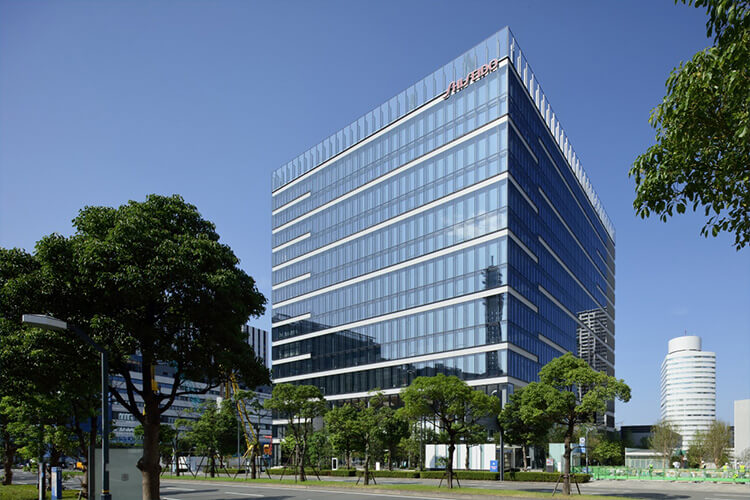
The Shiseido Global Innovation Center (GIC) is a facility to create new value in beauty through diverse integration of a variety of business and the involvement of both domestic and international leading-edge R&D institutes. The GIC's nickname, "S/PARK," expresses two meanings: one is “Shiseido’s Park”, the place attracts many people, and the other is the laboratory "SPARKS" innovative ideas.
The 1st and 2nd floors are open communication areas designed for “meeting with inspiration of beauty.” The space was produced by Kundo Koyama of ORANGE AND PARTNERS and designed by Ohki Sato of NENDO. The 4th floor features a collaboration area comprising business meeting spaces which is rare in typical research facilities, and research labs for joint projects with external research centers. Research floors from the 5th to the 15th floors are equipped with latest research facilities which support basic, fundamental research activities. The space also function as office facilities enabling flexible, varied working styles among research personnel.
Meiho Facility Works' Construction Management Services
Project proposal support during public calls for developers, participation from the concept stage, concept and preliminary plan development, design build contractor (general contractor) selection support, design and construction management, Project Management Office (PMO) support.
Appointment of CM company to create a
“New Form of Research”
- Q1 How did Shiseido start this project?
-
Mr. Tetsuyuki Kushiro
The project started in 2014. Shiseido had decided to focus on R&D and marketing investment to ensure continued growth over the next 100 years, and as a result significant increase in the number of new researchers was expected. Our existing research facilities were limited in size, so we began searching for a place to relocate. However, simply finding a bigger space would not do us that much good, as we wanted to change the research approach itself and develop new form of research which would lead to future innovation. We started thinking about what we needed to do in order to accomplish this goal.For some time we had felt that good communication with customers is the key in future R&D, which is why we wanted to establish our new R&D center in the city center, rather than the suburbs, as an “urban-style open-laboratory.” While browsing Google Maps one day, I happened across a large tract of unused land in Yokohama, and after looking into it I learned that this land, part of the city's Minato Mirai 21 district, was for sale. Our director in charge and CEO were all in agreement about pursuing this property, so things moved along quickly.
- Q2 As the project owner, what types of challenges did you face at the project's outset, and why did you decided to hire a CM company?
-
Mr. Kushiro
Our CEO, Masahiko Uotani told us that the internal project office and contactors alone were not enough to pursue the project, that we needed to incorporate the ideas of researchers into facility design as well. Therefore, we created working groups for each project phase and got the researchers involved.However, nobody in-house had any experience with the construction of new research facilities, which left us unsure of what to do next. We were not sure whether project staff, who had no experience with construction projects, should really be working directly with the construction companies. Because of this, we decided to seek out support and began considering the services of a CM company.
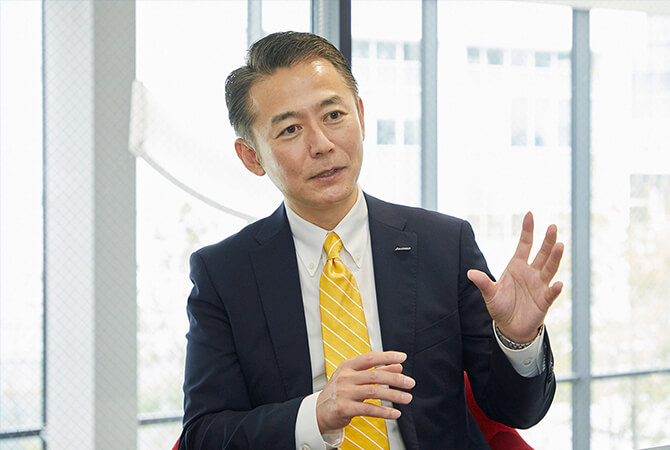
Shiseido Global Innovation Center (S/PARK) Project Leader Mr. Tetsuyuki Kushiro - Q3 Why did you choose to use a CM company? What were your initial impressions of Meiho Facility Works?
-
Mr. Kushiro
Rather than trying to simply handle all management process, the Meiho representatives explained in a clear and understandable manner what Meiho was able to do in each individual project phase and made our choices clear. That really impressed us. Meiho did not push us too hard—I mean that in a positive way, of course! [laughs] Because Meiho gave us the final decision regarding which areas to request assistance and promised to devote their full efforts to the tasks requested, we felt we could really trust them.
Achieving Goals While Keeping Within Budget
- Q4 Which aspects of the land purchase process did you find difficult, and in what ways did Meiho help you in this regard?
-
Mr. Kushiro
When we found the land we wanted, there was a little less than two months remaining until the listing deadline set by Yokohama City. At that point we made a contract with Meiho to help us with only one task: helping to prepare the required proposal paperwork to apply for the land purchase. We had not decided whether we wanted to request additional CM support from Meiho in the future, and Meiho was very understanding, telling us we did not have to make a final decision at that time.Approval from Yokohama City was required before making the land purchase, and we had to understand Yokohama City’s expectations towards developers and then create an appropriate proposal which addressed their needs. At the same time, there were things that we wanted to accomplish as Shiseido through our new research facilities as well. I guess it was very challenging for Meiho to consider both aspects. Despite the short time frame Meiho prepared 3D rendering, enabling us to embody the image, which was really helpful. Fortunately, our urban-style open laboratory concept was a good fit for Yokohama's goal of creating greater prosperity in city-center areas, and we successfully concluded the land purchase.
- Q5 How did the general contractor selection process go?
-
Mr. Kushiro
Even though we had fulfilled all of Yokohama's land-purchase requirements, we were unable to contact a general contractor until the city publicly announced us as their official choice of land developer. During that waiting period, Meiho contacted a number of general contractors while keeping our name—the client name—a secret, feeling out the industry for contractors potentially interested in a design and build contract.Meiho proceeded with the preparations for various arrangements related to the general contractor selection process, such as conditions for materials and labor costs changes and fair cost settlement method in response to design changes. These advance arrangements really helped us out later down the line: Even if materials and labor costs were to suddenly increase, or design changes were made, no problems would arise as long as relevant stipulations were included in the specifications document and RFP, and Meiho made all of these necessary preparations in advance.
When it came time to select of a contractor, Meiho communicated our requirements to ensure that the contractors understood our needs fully, and advised us to request secondary proposals. We were still unsure of just how much we could reasonably ask of general contractors, so their expertise really helped us.
- Q6 What were your concerns during the construction?
-
Mr. Kushiro
Our construction project was going on at a time when Olympic related projects were facing budget over run problems, seismic damper equipment data falsifications had just come to light, and various other problems were occurring throughout society. These led to worries regarding quality, construction schedules and cost increases in our project.Mr. Takuma Kurahashi
We created several dozen working teams comprising young researchers and engaged in free exchanges of ideas about things we wanted to do. There were 120 new ideas in total, and although we knew it was necessary to narrow these down, we were not sure exactly how to start. We faced a number of challenges, including figuring out how to integrate these new ideas into the construction project, and determining what needed to be decided by when. All throughout these efforts, Meiho was right there by our side, providing helpful suggestions and advice. The cost transition was registered in the tracking document from the design phase and Meiho was aware of overall project cost at all times, which helped us to make decisions when there were new ideas or requests. Meiho was able to help us implement new ideas we deemed necessary and adjust other costs accordingly to compensate, thus enabling the best possible decisions on our part regarding which ideas to incorporate.
Thanks to this assistance, we achieved most of our ideas proposed at the outset, including the "S/PARK Beauty Bar" where researchers can interact directly with customers, and the "Living Lab" with its re-creations of a daily living environment.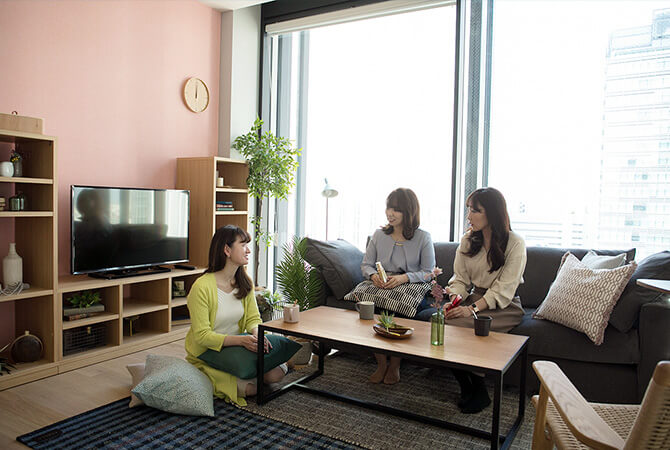
The "Living Lab," which simulates a room in an apartment unit. By having users use makeup products within a standard living environment, Shiseido gains deeper insights into their subconscious actions, psyches and thinking. The Living Lab is a feature desired by researchers to recreate a real living scene.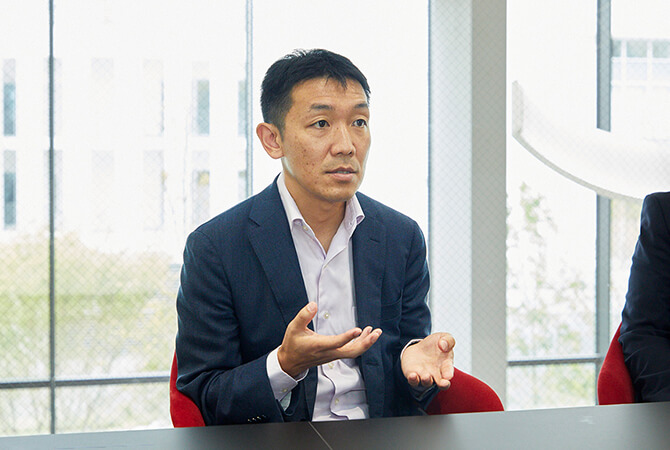
Shiseido GIC Supervisory Department S/PARK Communications Group Manger Mr. Takuma Kurahashi
Utilizing Experience Gained from a Once-in-a-lifetime, Large-scale Project for Future Endeavors
- Q7 What did you think of Meiho's PMO support?
-
Mr. Kushiro
As the project progressed, starting from construction of the 1st and 2nd floors communication area, office and lab facilities, relocation after the completion of construction, the number of stakeholders grew remarkably, which created a major coordination of roles and responsibility and interest adjustment among people involved. Amidst of all, Meiho worked alongside us as if they were a member of the Shiseido team, creating project structure from a neutral standpoint while supporting us with preparing back up document for explanations to stakeholders and negotiations. We were very grateful for Meiho's support, and contractors must have found it much easier to do their jobs.Moreover, Meiho served as helpful advisors as we faced various changes and judgment calls, providing the underlying support we needed to make our decisions. I remember one instance in which we were on the phone consulting from morning until night. [chuckles]
- Q8 Half a year has passed since your new facilities opened. How do you feel looking back on the project now, and what are your goals for the future?
-
Mr. Takuma Kurahashi
I will most likely never have the opportunity to take part in a project of this scale ever again. However, I plan to make full use of the experience I gained by applying the Meiho-style PM skills I observed firsthand in future endeavors.Mr. Kushiro
Having trustworthy partners such as Meiho and the construction companies and designers we worked with made us feel safe and secure along the way. At the same time, my experiences made me keenly aware of just how much determination and energy is needed on the part of the client-side project manager in order to process so many stakeholder opinions and carry out an endeavor of this scale.
At the start, the research staff felt that the project was not a personal concern of theirs, but after joining the working groups it became very personal to them and they took an active part in the creation of the new facilities. When I think about the GIC's concept, "devise to transform research styles and foster innovation," I feel we have only just finished creating the devise and relocation. Now we must change the ways in which researchers work and promote greater innovation.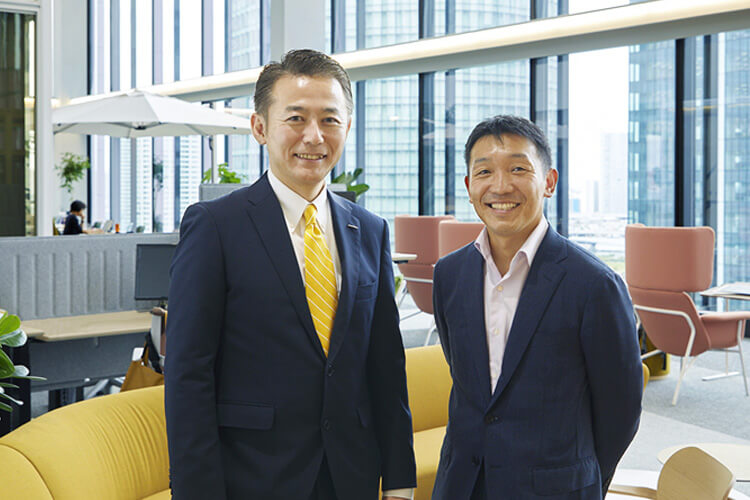
A special thanks to Mr. Kushiro and Mr. Kurahashi for taking time for this interview.
Overview of S/PARK facilities
toured by Shiseido for the interview
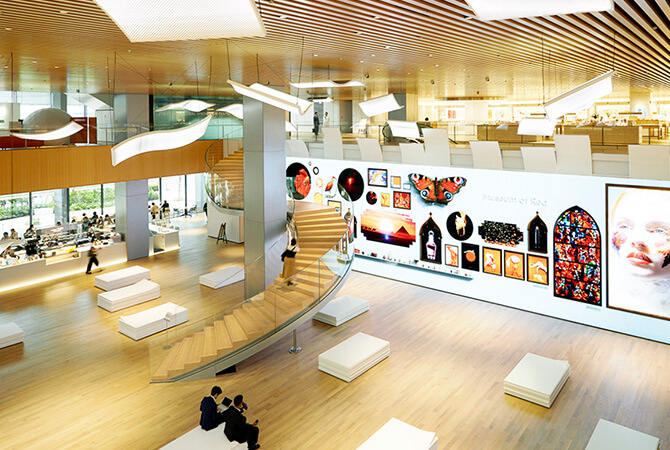
The massive Sony 16K Crystal LED screen—the only one of its kind worldwide—was particularly impressive. According to Mr. Kushiro, "We wanted to revamp Shiseido's image and present it as a more active brand, which is why we chose to include this screen." Children from a nearby nursery stop by as their walking course.

Rather than display of document exhibits, this museum offers interactive, hands-on experience that encourages visitors to think about beauty, which is seldom a central focus in day-to-day life. This interactive museum, located on the 2nd floor and admission free, introduces cutting-edge technologies of the research center that visitors can only see here.
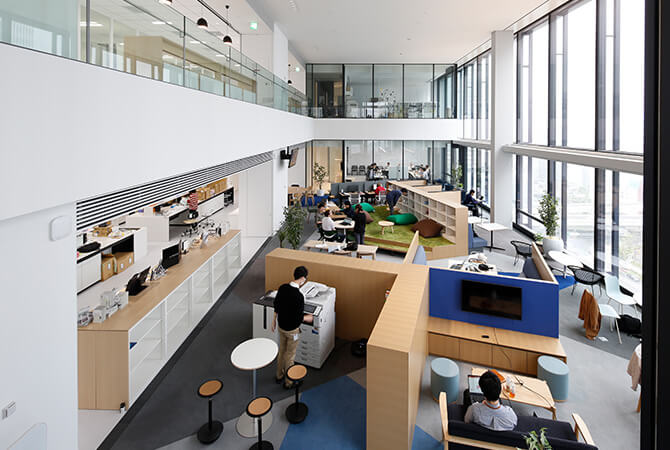
The laboratory floors are located above and below the office floors which are located upper floors of the building. The area is outfitted with latest experimental equipment enabling researchers to immediately try out new ideas they gained as they walk around the building and interacting with various people.

The cafeteria is located on the most comfortable space, the top floor (15th)of the building for use by the employees. As the designer had aimed, researchers bring their laptop PC and work here throughout the day. Meiho’s furniture selection specialists helped select the cafeteria's furniture.
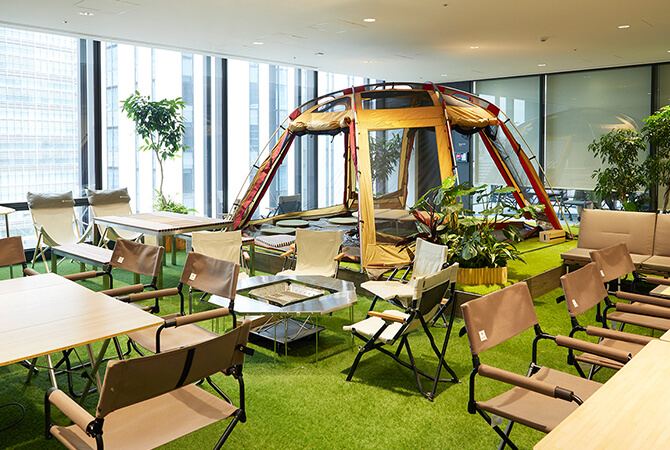
The lounge was designed to resemble an outdoor campground with a large tent, a massive tank containing freshwater fish. Relaxing atmosphere allow users to focus on their true feelings and ideas.
Meiho is strives to capture client’s needs and based on this understanding
we offer solutions to your needs and problems.
Feel free to contact us anytime regarding construction project consultations and questions regarding our services.

